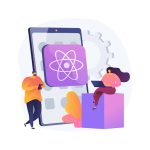Businesses must use the right technology and stay on top of trends. For example, an enterprise may take advantage of smart app technology that is currently changing the mode of operations. These applications are not only smart but also incorporate AI capabilities in the automation of tasks, data analysis, and real-time decision-making. Smart apps are the new kind of applications that are granted with artificial intelligence and power apps development capabilities and can learn from data, spot patterns, and adapt to user behavior.
They allow companies to perform their tasks more efficiently, increase productivity, and provide customers with a custom-tailored experience. In this blog, we’ll be looking into the realm of smart apps and learning how businesses, with the help of Power App Consulting, can leverage the capabilities of AI within Power Apps to develop bespoke solutions.
Table of Contents
Exploring The Power Of Smart Applications
The idea of smart apps is a giant step in the field of applications towards the next generation of application development. These smart tools are a huge step towards a new way of business operation by using AI power to automate tasks, analyze data, and provide actionable insights.
The Evolution of Smart Apps
Smart apps are the next generation of software applications, which are now more than just static functions. They are the applications that are imbued with AI capabilities, which make them dynamic. Unlike traditional applications that depend on static rules and structured data inputs, smart apps incorporate AI algorithms to learn from data, change according to user behavior, and perform intelligent decision-making processes without the need for human involvement.
Conceptual Blocks of Smart Apps
Data Analytics
Smart applications of such apps run on the big data amassed by businesses and help in making important decisions based on data analysis. Making use of the latest technology tools, machine learning, and predictive analytics, these apps can detect patterns, trends, and abnormalities within data sets, allowing organizations to improve processes and exploit opportunities.
AI Integration
These smart apps are the ones which are the sole reason for applying AI in cognitive tasks which were assumed to be the job of the human brain. AI applications in the field of NLP, computer vision, sentiment analysis, or recommendation systems contribute to the improvement of smart app features and functionality.
Real-time Interaction
Smart apps enable the immediate communication and engagement of users who are supported by AI-enabled chatbots, virtual helpers, and conversational systems. These applications comprehend natural language queries, interpret user intent, and deliver context-sensitive responses, which lead to an improved user experience and the building of trustworthy relationships across different communication channels.
Benefits of smart apps
Enhanced Efficiency
Smart apps empower organizations to carry out monotonous tasks and systematize procedures automatically, which results in higher efficiency, lower manual mistakes, and better resource allocation.
Improved Decision-making
An intelligent app uses information in the present and future from the data analysis. This task offers the decision-maker intelligence through up-to-date data so that they act at the right time with the right information. The consequence is business agility and competitiveness
Personalized Experiences
The AI utilization by smart apps is a source to establish personalized services; consequently, this strengthens customer satisfaction and loyalty and keeps them coming back.
Innovation and Differentiation
By adopting new technologies like AI, the apps on smart devices enable businesses to be innovative and distinguish themselves in the market, which is favorable for their long-term success and growth.
AI Capability Impacting on Power Apps
AI has a rapidly growing influence on app development now that AI applications are being equipped with new smart features. Another feature of Power Apps is the ability to have AI capabilities embedded in it, which is different from other platforms, and this makes the work of the developers easy.
Predictive Analytics
The intelligence of smart applications is mainly based on analytics; thus, the crucial issues of forecasting trends, making data-driven decisions, and predicting future outcomes can be solved with these applications. This option is a perfect way to get the most out of Power Automate Development and Power Automate Consulting, ensuring a high production level.
Computer Vision
Another AI’s use case is computer vision which falls into the category of a visual recognition process, it provides the ability to understand visual content and analyze images or videos. As with the case of Power App, the developers can also leverage computer vision abilities to automate tasks, obtain insights from visual data, and build new functionalities.
Smart Apps: Real-World Implementation
AI-driven smart applications prove to be a great alternative to traditional workflow standards that can be taken away by automated tasks, data analysis, and personalized service.
Retail
Demand Forecasting
The smart apps can be used to analyze previous sales statistics, current trends, and external factors which can then be used to make a forecast of demand for a particular product. You can do this whole thing through Power BI and in case you have some issues, Power BI consultancy is the best solution.
Personalized Recommendations
In line with AI algorithms, smart apps will scrutinize this data using which it will analyze consumer preferences, purchase history, and browsing behaviour to personalize product recommendations.
Dynamic Pricing
In the real-time environment, these price-setting algorithms can be smart enough to adjust the product prices on the fly; factors like demand, competitor prices, and stock levels can be taken into consideration here.
Healthcare
Medical Diagnosis and Treatment Planning: Through the use of AI-infused smart apps, doctors can diagnose disease effectively, examine and analyze medical images, and prescribe proper courses of treatment.
Remote Patient Monitoring
Wearable technology, sensors, and electronic health records are the sources of data that can be received and processed by modern healthcare applications.
Drug Discovery and Development
AI-enabled smart applications can search for the most fitting drug candidates from a large data pool, and predict the efficacy and safety of the drugs.
Manufacturing
Predictive Maintenance
Smart apps which are coupled with predictive analytics can be used remotely to see the performance of the equipment, to find anomalies, and to predict possible failures.
Quality Assurance and Defect Detection
Visual intelligent apps can be used to compare items to specifications, defects, and quality issues. This gives uniformity to the product, not much redoing which is less time-consuming and complies with the quality standards.
Supply Chain Optimization
Smart apps that can process data from various sources like suppliers, distribution chains, and demand forecasting models can develop more efficient supply chain processes, better inventory management, and avoid disruptions. This results in a higher level of efficiency, lower costs, and greater supply chain resilience.
Finance
Fraud Detection and Prevention
Smart apps that are driven by AI algorithms can do market data analysis, pattern recognition, and freaky transaction detection to find fraudulent transactions.
Customer Service Automation
AI-powered chatbots associated with smart apps can be used to address customer queries, provide personalized help, and even interact with customers for self-service transactions.
Risk Management and Portfolio Optimization
AI-powered apps can access data, evaluate risks, predict the future, and make the best allocations by using smart risk models and predictive analytics.
Wrap-Up
Using AI-based smart apps made possible by Power Apps is a brand new game where companies in any sector can excel. AI functions can be utilized by Power Platform Development and Power BI Consulting, which will help simplify operations, boost efficiency, and provide a personalized approach for customers.











